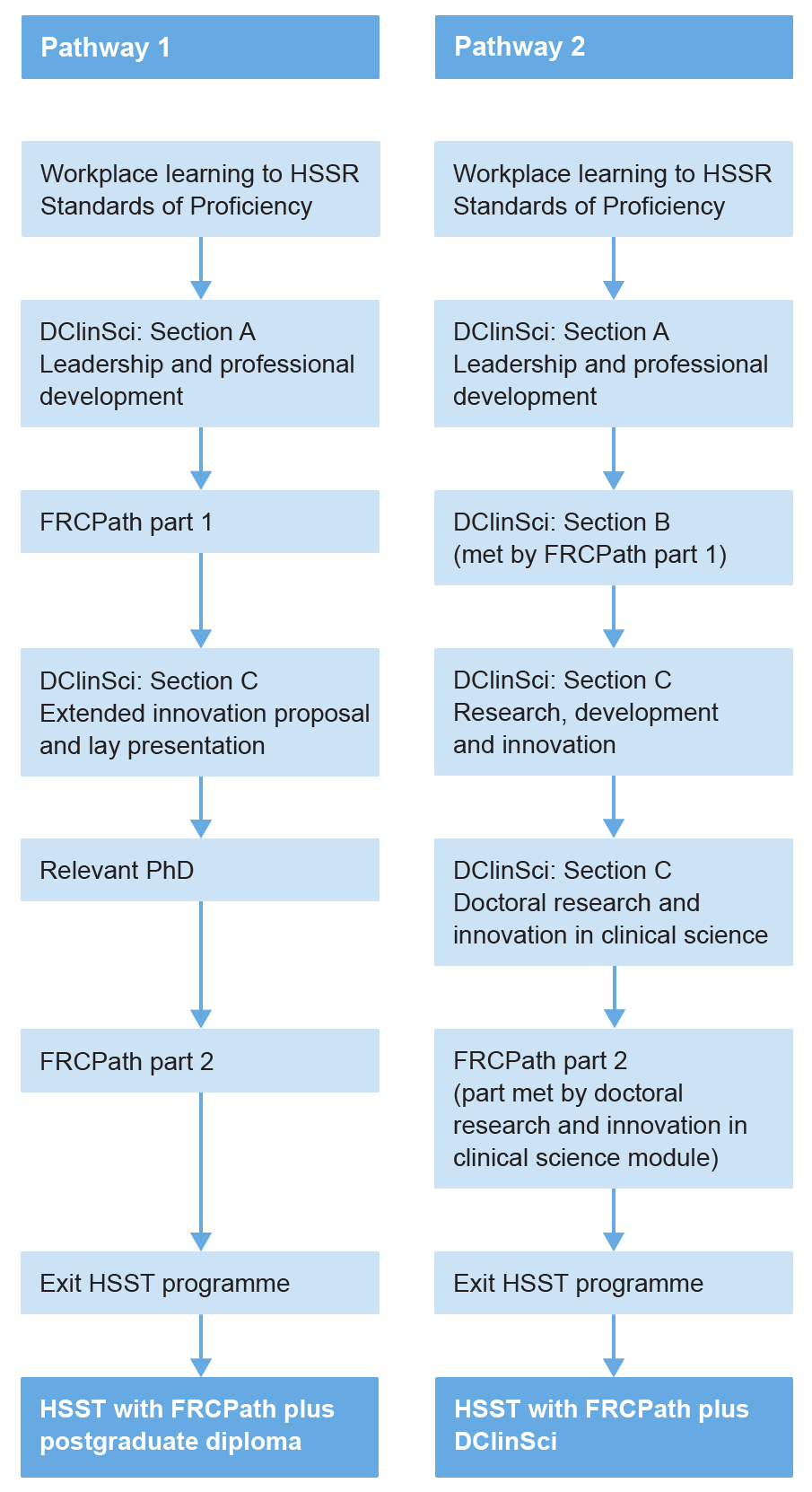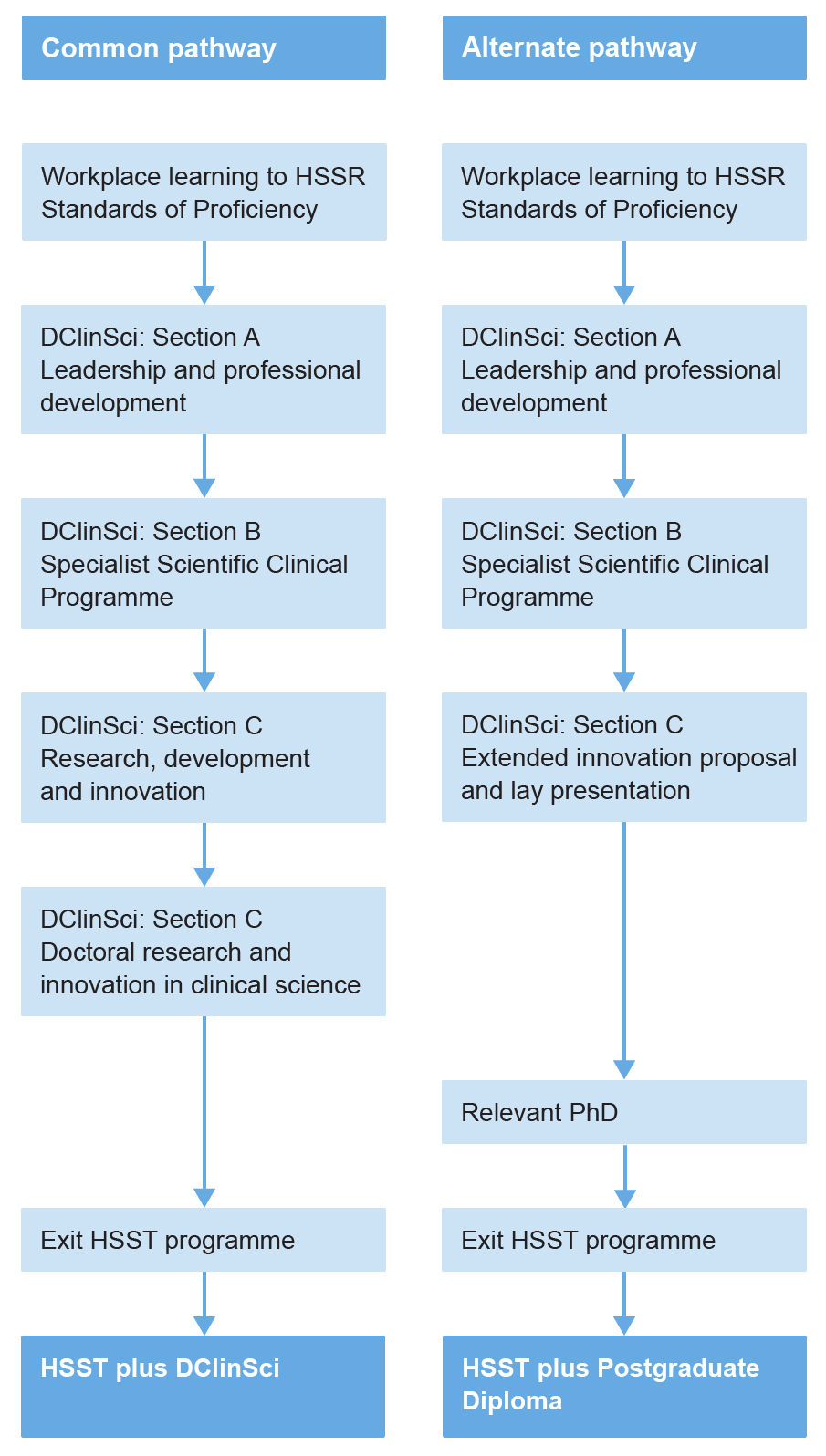Since the launch of the HSST programme there has often been confusion regarding the pathways available for trainees who may have pre-existing doctoral qualifications. This situation is further complicated for Life Science trainees with respect to the requirement to attain Fellowship of the Royal College of Pathologists (FRCPath) in order to achieve successful completion of the programme. Currently some RCPath specialties have a written component to achieve part 2, which can be achieved by completion of the DClinSci. Whereas other specialties have removed the written component requirement altogether. Make sure you are aware of the current RCPath requirements for your specialty before deciding on your HSST pathway.
The Manchester Academy for Healthcare Scientist Education (MAHSE), who deliver the Professional Doctorate programme, The Royal College of Pathologists (RCPath), and the National School of Healthcare Science agreed that:
- MAHSE partner Universities will accept a pass in the FRCPath Part 1 examination in a relevant specialty in place of the Professional Doctorate (DClinSci) Section B.
- The Royal College of Pathologists will accept the research component of the Professional Doctorate (DClinSci) in a relevant specialty as the written option for the FRCPath Part 2.
Click this link to read the joint statement agreement.
What are the different sections of the DClinSci?
- Section A – Leadership and Professional Development
- Section B – Specialist Scientific Clinical Programme
- Section C – Research, Development and Innovation
- Module: Research Project
- Module: Doctoral Research and Innovation in Clinical Science
Completion of programme for Life Science trainees
A trainee in Life Sciences will complete workplace learning, the DClinSci or PgDip (with an approved previous relevant PhD) and fulfil the requirements of the FRCPath examination to meet all the learning objectives of the RCPath HSST curriculum. They will successfully exit the programme as summarised in the pathway diagram below.

HSST Life Sciences pathway options
Content of Life Sciences pathway diagram
Pathway 1
- Workplace learning to HSSR Standards of Proficiency
- DClinSci: Section A – Leadership and professional development
- FRCPath part 1
- DClinSci: Section C – Extended innovation proposal and lay presentation
- Relevant PhD
- FRCPath part 2
- Exit HSST programme
- HSST with FRCPath plus postgraduate diploma
Pathway 2
- Workplace learning to HSSR Standards of Proficiency
- DClinSci: Section A – Leadership and professional development
- DClinSci: Section B (met by FRCPath part 1)
- DClinSci: Section C – Research, development and innovation
- DClinSci: Section C – Doctoral research and innovation in Clinical Science
- FRCPath part 2 (part met by doctoral research and innovation in Clinical Science module)
- Exit HSST programme
- HSST with FRCPath plus DClinSci
Completion of programme for Physical Sciences, Bioinformatics and Physiological Sciences trainees
All trainees in Physical, Bioinformatics and Physiological Sciences are normally required to undertake a ‘Common Pathway’ completing all sections of the DClinSci and workplace learning, resulting in them exiting the programme with a DClinSci.
An ‘Alternate Pathway’ is available for those with an appropriate research doctorate (PhD). This requires completion of all components of the DClinSci except the research project. However, since the research doctorate (PhD) is not admissible in lieu of Section C of the professional doctorate, those trainees opting to follow this pathway will exit the programme with a Postgraduate Diploma in Leadership and Professionalism for Healthcare Sciences.

HSST Physical Sciences, Bioinformatics and Physiological Sciences pathway options
Content of Physical Sciences, Bioinformatics and Physiological Sciences pathway diagram
Common pathway
- Workplace learning to HSSR Standards of Proficiency
- DClinSci: Section A – Leadership and professional development
- DClinSci: Section B – Specialist Scientific Clinical Programme
- DClinSci: Section C – Research, development and innovation
- DClinSci: Section C – Doctoral research and innovation in clinical science
- Exit HSST programme
- HSST plus DClinSci
Alternate pathway
- Workplace learning to HSSR Standards of Proficiency
- DClinSci: Section A – Leadership and professional development
- DClinSci: Section B – Specialist Scientific Clinical Programme
- DClinSci: Section C – Doctoral research and innovation in clinical science
- Relevant PhD
- Exit HSST programme
- HSST plus Postgraduate Diploma